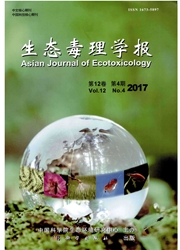

 中文摘要:
中文摘要:
为了研究壳聚糖辅助下玉米(Zea mays L.)对铅污染土壤的修复能力,采用L9(3^4)正交试验进行研究,考虑了4因素3水平,4因素为土壤铅含量、壳聚糖含量、壳聚糖溶液pH值以及加入壳聚糖后的提取时间.研究结果表明,加入壳聚糖会造成玉米生长停滞,甚至死苗,原因在于壳聚糖属于天然高分子有机物,会造成土壤板结,阻碍植物吸收水分,同时壳聚糖将土壤中的大量重金属溶出,造成玉米重金属中毒.加入壳聚糖后,玉米对铅的吸收较对照结果有很大提高,壳聚糖能够促进铅元素从土壤向植物体内转移,但壳聚糖促进铅元素从玉米地下部分向地上部分转移的能力较弱;综合壳聚糖的促进效果,在土壤铅含量为1.8g·kg^-1,壳聚糖含量为5mmol·kg^-1(土),壳聚糖溶液pH值为4.5,提取时间为7天的条件下,有利于促进铅在玉米地上部分的吸收.
 英文摘要:
英文摘要:
Soils are a major sink for lead (Pb) , which can be absorbed and bioaccumulated by plants and animals and eventually consumed by humans. Phytoremediation, the use of plants to remove or stabilize contaminants, is an inexpensive technique that can be applied to large areas for both remediation and the prevention of soil erosion. However, the low solubility of most lead compounds rarely results in Pb hyperaccumulation in plant. The use of chemical agents to increase metal desorption and solubility from soil has been a helpful tool to enhance metal uptake by plants. In this study, we investigated the potential of adding chitosan to Pb contaminated soils to increase Pb accumulation in corn. Cross-cut tests on corn absorb lead from soil are made on the base of four parameters: Pb concentration [ total soil Pb 0.9, 1.2, 1.8g·kg^-1] , chitosan concentration [2.5, 5.0, 7.5mmol·kg^-1] , pH of chitosan solution [4.5, 5.5, 6.5] , time [ 1, 4, 7 day]. The results indicated that within 7d after applying chitosan solution to the contaminated soil, the growth of corns was inhibited, even led to death. Chitosan was a natural macromolecular organism, it would caused soil harden, and corns would be poisoned by heavy Pb ion because of the complexation. The effectiveness was increased as Pb desorption from soil with chitosan adding; We also found that, at the best condition of Pb concentration [total soil Pb 1.8g· kg^-1] , chitosan concentration [5mmol· kg^-1] , pH of chitosan solution [4.5], time [7 day], chitosan significantly increased Pb translocation from roots to shoots, Pb concentration in the corn shoots increased 3-fold, and Pb concentration in the corn roots increased 1-fold as compared to the control group (no chitosan). Results from this study suggest that with appropriate design, chitosan-assisted Pb phytoextraction may provide a cost-effective soil decontamination strategy.
 同期刊论文项目
同期刊论文项目
 同项目期刊论文
同项目期刊论文
 期刊信息
期刊信息
